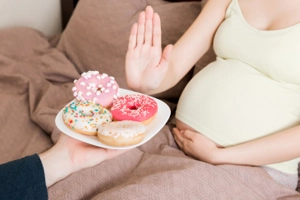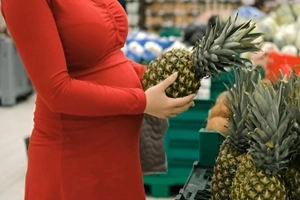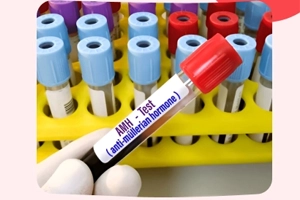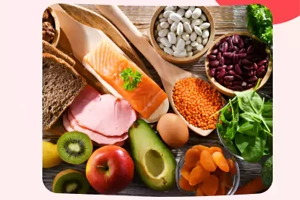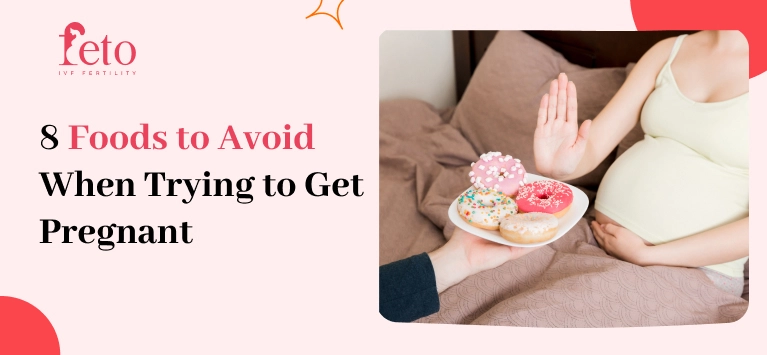
What Foods Should You Avoid When Trying To Get Pregnant
Key Facts
- Trans fats can increase infertility risk by up to 73%.
- Excess sugar impacts ovulation and sperm motility.
- Limit caffeine to <200 mg/day.
- High-mercury fish can harm reproductive health.
If you’re trying to conceive, chances are you’ve started paying closer attention to your lifestyle. While factors like stress, sleep, and medical conditions play a role, diet is one of the most powerful influencers of fertility. What you eat can affect hormone balance, egg quality, sperm health, and even the chances of a healthy implantation.
But here’s the tricky part: not all “healthy” foods are fertility-friendly, and some common dietary choices can quietly hinder your efforts to get pregnant. So, what are the foods to avoid when trying to conceive? Let’s break it down with science-backed insights and practical tips.
Why Diet Matters for Fertility?
Fertility is a complex process that relies on hormonal harmony, good-quality eggs and sperm, and a healthy uterine environment. Nutrients like folate, iron, zinc, and healthy fats promote conception, but processed foods, trans fats, and excessive sugar can disrupt ovulation and sperm production.
Research suggests that couples following a Mediterranean-style diet—rich in whole grains, lean protein, fruits, and vegetables experience better fertility outcomes compared to those on Western-style diets high in processed meats, fried foods, and sugary beverages.
8 Foods to Avoid for Better Fertility
1. Red and Processed Meats
Bacon, sausages, hot dogs, and processed deli meats often contain preservatives and unhealthy fats that negatively impact sperm quality and ovulation. High intake of these meats is linked to reduced fertilization rates.
Swap it with: Plant-based proteins (lentils, beans, tofu) or lean poultry and fish with low mercury content.
2. Sugary Foods and Refined Carbs
White bread, pastries, and sugary treats can cause rapid insulin spikes, disrupting hormone balance and potentially affecting ovulation. Studies show a higher intake of refined carbs is associated with lower fertility in women.
Swap it with: Whole grains like oats, quinoa, and whole wheat bread.
3. Sugar-Sweetened Beverages
Soft drinks and energy drinks don’t just add empty calories—they’re linked to decreased fertility in both men and women. For men, sugary beverages can lower sperm motility.
Swap it with: Water, coconut water, or herbal teas.
4. Trans Fats
Often found in fried foods, margarine, packaged snacks, and fast food, trans fats can increase the risk of ovulatory infertility by up to 73%. These fats also promote inflammation, which is the enemy of fertility.
Swap it with: Healthy fats from avocado, olive oil, and nuts.
5. High-Mercury Fish
Fish like king mackerel, swordfish, shark, and bigeye tuna contain high mercury levels that can harm egg and sperm quality and increase the risk of developmental problems during pregnancy.
Safe options: Salmon, sardines, and anchovies (low in mercury and rich in omega-3s).
6. Excessive Caffeine
If your day starts with multiple cups of coffee, you might want to cut back. Studies recommend limiting caffeine to 200 mg per day (about one cup of brewed coffee) to reduce the risk of miscarriage and fertility issues.
7. Alcohol
Alcohol can disrupt estrogen balance, which may lower fertility in women. For men, it impacts sperm count and motility. While occasional drinks may seem harmless, experts advise avoiding alcohol completely while trying to conceive.
8. Unpasteurized Dairy and Soft Cheeses
Cheese made from unpasteurized milk can contain harmful bacteria like listeria, which increases miscarriage risk. Also, raw eggs and undercooked meats should be avoided for the same reason.
Other Lifestyle and Food Habits to Avoid
- BPA-containing plastic containers: BPA is an endocrine disruptor linked to hormonal imbalance.
- Certain lubricants: Some reduce sperm motility. Use fertility-friendly options.
Tips to Improve Fertility Through Diet
- Follow a Mediterranean-style diet such as whole grains, lean protein, fruits, vegetables, and healthy fats.
- Avoid skipping meals to maintain stable blood sugar and hormone levels.
- Stay hydrated and aim for a balanced intake of macros and micronutrients.
Final Thoughts
Your fertility journey starts with small, consistent lifestyle choices and what’s on your plate matters more than you think. By avoiding these foods and focusing on a nutrient-rich, balanced diet, you can boost your chances of conceiving and preparing your body for a healthy pregnancy. Need personalized advice? Consult our fertility specialist or nutritionist to tailor a plan for your unique needs.




